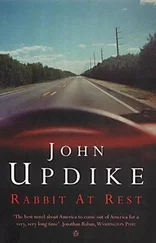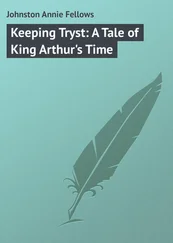As when standing above that glistening trail of a disappeared worm or slug, Ahmad feels tall, tall enough to be dizzy, looking down at this short round girl whose indignation at his yearning for purity gives her voice and lips a lively quickness. Where her lips meet the other skin of her face there is an edge, a little line like the circle cocoa leaves on the inside of a cup. He thinks of sinking himself into her body and knows from its richness and ease that this is a devil's thought.
"Not hate your body," he corrects her, "but not be a slave to it either. I look around me, and I see slaves-slaves to drugs, slaves to fads, slaves to television, slaves to sports heroes that don't know they exist, slaves to the unholy, meaningless opinions of others. You have a good heart, Joryleen, but you're heading straight for Hell, the lazy way you think."
She has halted on the sidewalk, in a bleak, treeless stretch, and he thinks it is her anger at him, her disappointment near tears, that has stopped her, but then realizes that this drab doorway is hers, with its four wooden steps stained gray as if with never-ending rain. He at least lives in a brick apartment building on the north side of the boulevard. He feels guilty about her disappointment, since in inviting him to walk with her she laid herself open to expectation.
"You're the one, Ahmad," she says, turning to go in, planting a foot on the first drab step, "don't know where he's heading. You're the one don't know which fucking end is up."
Sitting at the heavy old round brown table that he and his mother call "the dining table" though they never dine at it, Ahmad studies the Commercial Drivers' License Home Study Course booklets, four of them, each stapled together.
Shaikh Rashid helped him send away to Michigan for them, writing the check for $89.50 on the mosque account. Ahmad always thought truck-driving was something for simpletons like Tylenol and his gang at school, but in fact there is a confusing amount of expertise to it, such as all the hazardous materials that have to be publicly identified one from another by means of four different placards measuring ten and three-quarters inches and placed in a diamond shape. There are flammable gases like hydrogen and poisonous/ toxic gases like compressed fluorine; there are flammable solids like wetted ammonium picrate and spontaneously combustible ones like white phosphorus and ones spontaneously combustible when wet like sodium. Then there are real poisons like potassium cyanide and infectious substances like the anthrax virus and radioactive substances like uranium and corrosives like battery fluid. All this has to be trucked, and any spills of a certain quantity (depending on toxicity, volatility, chemical durability) must be reported to the DOT (Department of Transportation) and EPA (Environmental Protection Agency).
Ahmad is sickened, thinking of the paperwork, the shipping papers bristling with numbers and codes and prohibitions. Poisons should never be loaded with animal or human food; hazardous materials even in a tightly sealed canister should never ride up front with the driver; beware of heat, leaks, and sudden changes in speed. Besides hazardous substances there are ORM (Other Regulated Materials) that might have an anesthetic or irritating or noxious effect on a driver and his passengers, such as monochloroacetone or diphenylchlorarsine, and a material that might damage the vehicle if leaked, like the liquid corrosives bromine, soda lime, hydrochloric acid, sodium-hydroxide solution, and battery acid. All across this land, Ahmad now realizes, hazardous materials are hurtling, spilling, burning, eating roadways and truck beds-a chemical deviltry making manifest materialism's spiritual poison.
Then, the booklets tell him, there is, in shipping liquids by bulk in tanker trucks, outage, also called ullage, the amount by which the cargo falls short, so that the tank will not burst when its contents expand during shipping-if, say, ambient temperature goes as high as one hundred thirty degrees. And also, with tank vehicles, the driver must beware of liquid surge, more acute and dangerous in the case of so-called smooth-bore tanks than in that of those with inside baffles or complete compartments. Even in these, however, sideways surge can overturn a truck taking a curve too sharply. Forward surge can push a truck out into traffic at a red light or stop sign. Yet sanitation regulations forbid baffles in a tanker transporting milk or fruit juice; baffles make the tanks harder to clean, and hence invite contamination. Transportation is full of dangers that Ahmad has never before contemplated. It excites him, however, to see himself-like the pilot of a 727 or the captain of a supertanker or the tiny brain of a brontosaurus-steering a great vehicle through the maze of dire possibilities to safety. He is pleased to find in the trucking regulations a concern with purity almost religious in quality.
Somebody knocks at the door, at quarter of eight at night. The noise, not far from the table where Ahmad studies by the light of a battered bridge lamp, jolts him from his focus on ullage and tonnage, surge and flow. His mother quickly emerges from her bedroom, which is also her painting studio, and goes-rushes, even-to answer the knock, fluffing up her light red hair-nape-length, henna-enhanced-as she goes. She greets mysterious interruptions more hopefully than Ahmad. He is still, ten days after attending the infidel church service, nervous about having trespassed on Tylenol's territory; it is not impossible that the bully and his gang will waylay him sometime, even at night, calling him out from his own apartment.
Nor is it impossible, though unlikely, that an emissary from Shaikh Rashid knocks. His master has few disciples. He has seemed on edge lately, as if something weighs upon him; he feels to Ahmad like a finely honed element in a structure on which too much tension is imposed. This past week the imam showed a short temper with his pupil in a discussion of a verse from the third sura: Let not the infidels deem that the length of days we give them is good for them! We only give them length of days that they may increase their sins! and a shameful chastisement shall be their lot. Ahmad dared ask his teacher if there wasn't something sadistic in the taunt, and in the many verses like it. He ventured, "Shouldn't God's purpose, as enunciated by the Prophet, be to convert the infidels? In any case, shouldn't He show them mercy, not gloat over their pain?"
The imam presented half a face, the lower half being hidden by a trimmed beard flecked with gray. His nose was thin and high-arched and the skin of his cheeks pale, but not pale as Anglo-Saxons or Irish were, freckled and quick to blush, like Ahmad's mother (a tendency the boy has regrettably inherited), but pale in a waxy, even, impervious Yemeni way. Within his beard, his violet lips twitched. He asked, "The cockroaches that slither out from the baseboard and from beneath the sink-do you pity them? The flies that buzz around the food on the table, walking on it with the dirty feet that have just danced on feces and carrion-do you pity them?"
Ahmad did, in truth, pity them, being fascinated by the vast insect population teeming at the feet of godlike men, but, knowing that any qualifications or signs of further argument would anger his teacher, responded, "No."
"No," Shaikh Rashid agreed with satisfaction, as a delicate hand tugged lightly at his beard. "You want to destroy them. They are vexing you with their uncleanness. They would take over your table, your kitchen; they will settle into the very food as it passes into your mouth if you do not destroy them. They have no feelings. They are manifestations of Satan, and God will destroy them without mercy on the day of final reckoning. God will rejoice at their suffering. Do thou likewise, Ahmad. To imagine that cockroaches deserve mercy is to place yourself above ar-Rahim, to presume to be more merciful than the Merciful."
Читать дальше












